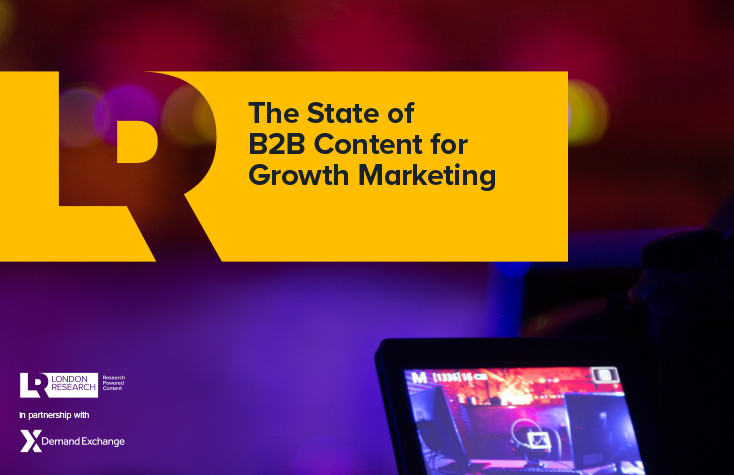ABM Account Based Marketing

Why Data-Driven Content is Essential for B2B Success
Content is the foundation of B2B marketing. But you already know that.
The problem? There’s so much content out there that most of it never even gets noticed. That’s where data-driven content makes all the difference.
In B2B, you’re not talking to casual browsers—you’re speaking to decision-makers who need facts, figures, and proof before they commit.
Generic content rarely moves the needle in B2B. Buyers today expect more—they want insight. They want data-driven content that helps them make informed decisions.
Here’s the catch: we’ve hit what’s called “Peak Content.” There’s more content being created than anyone can realistically consume, meaning much of it fails to make an impact.
So, how do you ensure your content stands out?
It comes down to research and quality.
With buyers becoming more discerning, they’re looking for content that genuinely informs their decisions. They’re comparing options, weighing the pros and cons, and expect content that does more than promote—it needs to educate and provide real value.
Creating high-quality content isn’t just another item on the to-do list—it’s essential for generating the kind of high-quality leads that drive business growth.
Building Trust Through Independent Research
Trust is everything in B2B marketing. Without it, no amount of data or strategy will convince buyers to choose your brand.
But trust isn’t built overnight—it’s cultivated through consistency, empathy, competence, and clear communication.

What Are the 4 Aspects of Building Trust in B2B Marketing?
Consistency
Maintaining a consistent brand voice and message across all channels is crucial. Whether it’s your website, emails, or social media, every touchpoint should reflect the same values and tone. Consistency reassures buyers that your brand is reliable and dependable.
Compassion
Understanding your customers’ challenges and addressing them with empathy shows that your brand isn’t just focused on selling—it’s genuinely interested in solving their problems. This approach builds rapport and fosters long-term relationships.
Competence
In B2B, showcasing expertise is non-negotiable. Support your claims with data, industry research, and case studies that demonstrate your authority and competence in the field. Research-based content positions your brand as a credible source of information.
Communication
Clear, honest communication is key to avoiding misunderstandings and building trust. Your content should be straightforward, transparent, and provide value without hidden agendas. Open dialogue establishes trust and signals that your brand is trustworthy.
The Importance of Trust in B2B Marketing
Trust isn’t just a buzzword—it’s the top priority for B2B marketers. According to Forbes, building trust should be the #1 focus in B2B marketing strategies.
Why? Because trust drives every aspect of decision-making in complex B2B sales cycles.
When your content is backed by credible sources, expert opinions, and transparency, it instils confidence in your audience. It positions your brand as a dependable partner rather than just another vendor.
Without trust, even the best content will fall flat.
What is Independent Research?
Independent research and co-branded content are effective tools for establishing credibility.
By collaborating with reputable third-party analysts or research firms, such as London Research, you bring an unbiased perspective to your content, making it more authoritative.
Including independent analysis in your strategy shows your audience that you’re committed to providing accurate information, not just promoting your own products or services.
This approach strengthens your position as a thought leader and builds trust with decision-makers.

Benefits of Data-Driven Content for B2B Success
Creating content that resonates is only half the battle. To achieve real success in B2B marketing, your content needs to be driven by data.
Why? Because data empowers you to speak directly to what your audience cares about, driving higher engagement and, ultimately, more conversions.
How Does Data Enhance Content Creation?
When you utilize analytics to understand your audience, you can craft content that truly resonates.
With data-driven insights, you’re no longer relying on guesswork—you’re making informed decisions based on real data about your target market.
This approach allows you to identify trends, topics, and gaps that matter most to your audience, resulting in content that’s more aligned with their needs and challenges.
Metrics such as engagement rates, click-throughs, and conversion rates give you a clear picture of what works and what doesn’t. These insights enable you to refine your content strategy, optimise your campaigns, and ultimately drive better marketing success.
As a result, you’ll see increased ROI and higher-quality leads, making your efforts more effective.
Practical Steps for B2B Companies to Adopt a Data-Driven Approach
Ready to put a data-driven approach into action?
Here’s where to start:
- Data Collection: Begin by gathering data from all your marketing channels, whether it’s website analytics, social media insights, or email performance. Every piece of information is valuable.
- Data Analysis: Analyse this data to identify patterns, preferences, and areas of opportunity. Are there particular topics or formats that get more traction? Use these insights to guide your content creation.
- Implementation: Apply what you’ve learned to your marketing campaign strategy. Create content that addresses identified pain points and targets your audience more effectively. With this approach, you’ll be able to make data-driven decisions that enhance your overall marketing performance.

Increased Lead Generation and Better Decision-Making
Data insights provide a deeper understanding of your audience, enabling you to create content that attracts the right leads.
By focusing on topics that align with your audience’s interests and decision-making process, you create content that draws in those who are more likely to convert.
This means your lead generation efforts are more targeted, resulting in a higher quality of leads.
With data-driven decision-making, you can adjust your strategy based on what the numbers tell you, rather than relying on intuition alone. This makes your marketing campaigns more precise and impactful.
Improved ROI and Marketing Efficiency
Data-driven content enables you to maximise your marketing efforts by focusing on what works best. You’ll spend less time on trial and error and more time executing strategies that deliver results.
By analysing performance metrics, you can allocate resources more effectively, ensuring that your marketing spend directly contributes to improved ROI.
This approach not only boosts marketing efficiency but also provides clarity on which activities drive the most value for your business, leading to more strategic decision-making.
Fostering Long-Term Customer Relationships
Building lasting relationships isn’t just about attracting customers—it’s about keeping them engaged.
Personalised marketing, informed by data insights, helps you create content that speaks directly to individual customer needs and preferences.
When your audience feels understood, they’re more likely to remain loyal and continue engaging with your brand.
Content tailored to specific pain points and interests encourages deeper engagement, transforming one-time buyers into long-term partners. This level of personalisation strengthens your customer relationships and fosters ongoing trust.

The Future of B2B Marketing is Data-Driven
The role of data and technology in B2B marketing is only going to grow.
As more companies adopt advanced analytics and AI tools, the pressure to keep up will intensify.
Those who embrace data-driven marketing strategies will be better positioned to deliver more impactful, targeted campaigns.
Predictions for the Future of B2B Marketing
Expect to see a greater focus on personalisation, with content that adapts dynamically based on the user’s behaviour and preferences.
Additionally, marketing technology will continue to evolve, providing new ways to harness data for better customer insights and more refined strategies.
The Role of AI in Data-Driven Content Creation
AI is transforming how data-driven content is created and managed. Tools powered by AI can automate data analysis, streamline content creation processes, and deliver insights at scale.
However, while AI can support your efforts, it shouldn’t replace human input. Independent research and expert opinions still play a critical role in maintaining content quality and credibility.
By combining AI capabilities with well-researched, data-driven content, you can offer a balanced approach that leverages technology while retaining the human element that builds trust and authenticity in B2B marketing.
Download the Report for More Data-Driven Insights
Want to see how leading B2B companies are using data to drive their content marketing strategies?
The State of B2B Content for Growth Marketing, a report in partnership with London Research, is backed by research and insights from over 350 organisations.
The report reveals how data-driven content helps companies overcome challenges in lead generation and achieve better ROI. It covers everything from content maturity and budgeting plans to the effectiveness of different content formats and channels.
By downloading the report, you’ll gain access to strategies used by top performers and insights into which channels are delivering the best results,
It’s a must-read for marketers looking to improve their data-driven approach and take their content marketing strategy to the next level.

FAQs (Frequently Asked Questions)
What is data-driven marketing, and why is it so critical for B2B?
Data-driven marketing uses data and analytics to guide decisions, ensuring that your content, campaigns, and strategies are based on concrete information rather than assumptions. It’s especially important for B2B, where decisions are often complex, and buyers need more convincing proof before committing.
How can I start implementing data-driven marketing in my business?
Begin by evaluating your existing data sources. Collect information on customer behaviour, campaign performance, and engagement metrics. From there, use this data to identify patterns and areas for improvement, and apply these insights to your marketing strategies.
How does data-driven content impact lead generation?
Data-driven content is highly targeted and relevant, which means it attracts the right audience. When your content is based on data, you can focus on the topics that matter most to your potential leads, increasing the likelihood of generating high-quality leads that convert.
What types of data should B2B companies focus on?
Key data points include website traffic, engagement metrics, lead quality, and conversion rates. Understanding these metrics can help you create content that addresses the specific needs and interests of your audience.
What are the main benefits of using a data-driven marketing strategy?
Data-driven marketing strategies help you optimise your content, achieve better ROI, and foster long-term customer relationships. You can see what’s working and what’s not, allowing you to adjust your tactics and make more informed decisions that contribute to overall business success.

About the Author
Nick is an experienced Marketing Campaign Manager renowned for steering successful demand and lead generation campaigns for various enterprises. His expertise lies in creating compelling content that strongly resonates with target demographics, effectively promoting lead magnets across diverse channels. Nick's strategic approach to marketing has consistently resulted in enhanced audience engagement and significant lead generation, underscoring his pivotal role in the success of the campaigns he manages.
About the Author

Nick is an experienced Marketing Campaign Manager renowned for steering successful demand and lead generation campaigns for various enterprises. His expertise lies in creating compelling content that strongly resonates with target demographics, effectively promoting lead magnets across diverse channels. Nick's strategic approach to marketing has consistently resulted in enhanced audience engagement and significant lead generation, underscoring his pivotal role in the success of the campaigns he manages.